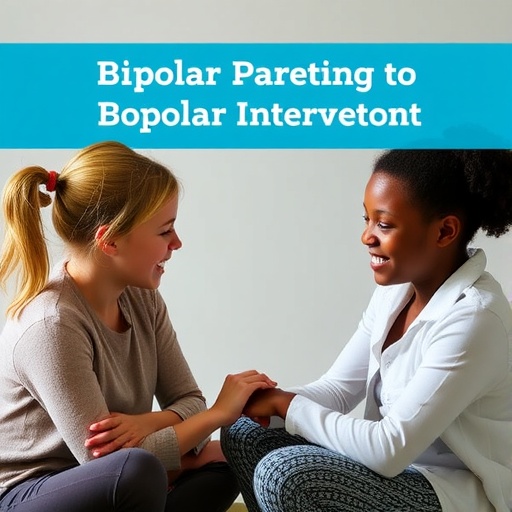In an ambitious and groundbreaking effort to address the challenges faced by families affected by bipolar disorder, researchers have launched a large-scale randomised controlled trial to assess the effectiveness of a novel online parenting intervention. Bipolar disorder (BD) affects millions worldwide, imposing significant personal and societal burdens. Beyond the direct impact on affected individuals, the condition frequently complicates parenting, leaving children vulnerable to emotional and behavioral difficulties. The new Integrated Bipolar Parenting Intervention (IBPI) aims to leverage digital technology to offer tailored support for parents with BD, empowering them to foster healthier outcomes for their children.
Bipolar disorder is characterized by extreme mood swings that range from manic highs to depressive lows, often disrupting daily functioning and interpersonal relationships. For parents living with BD, these fluctuations can undermine consistent parenting practices, resulting in unpredictable home environments. Research indicates that up to 60% of children of parents with bipolar disorder exhibit at least one mental health problem during childhood, with increased likelihood of developing serious psychiatric conditions themselves. Recognizing this intergenerational risk, the IBPI intervention was designed to provide accessible, targeted guidance to parents navigating the complexities of both their mental health and their caregiving role.
The forthcoming clinical trial represents the first definitive attempt to rigorously evaluate IBPI’s impact on child emotional and behavioral outcomes compared to standard treatment as usual (TAU). Conducted in the United Kingdom, the study recruits parents diagnosed with bipolar disorder who have children aged between four and eleven years. Recruitment channels include NHS services, mental health charities, and social media platforms, reflecting a commitment to reaching diverse and realistic populations. Prior to randomization, clinical diagnosis is confirmed using standardized screening measures.
Participants are randomly allocated to either receive IBPI combined with treatment as usual, or to continue with treatment as usual alone. The IBPI program itself is delivered through an online platform, designed to be accessible, engaging, and responsive to the specific challenges posed by bipolar disorder in parenting contexts. This digital approach allows for flexible, scalable support that transcends geographical and logistical barriers often encountered in traditional mental health interventions.
The primary endpoint of the clinical evaluation is a reduction in child emotional and behavioral problems at 24 weeks, measured using the Strengths and Difficulties Questionnaire (SDQ), a widely accepted metric in child psychiatry research. Complementing clinical outcomes, the trial incorporates a robust economic evaluation focusing on cost-utility through quality-adjusted life years (QALYs), utilizing the Child Health Utility 9 Dimensions (CHU9D) measure. This dual approach underscores the importance of proving not only clinical efficacy but also economic viability, critical for informing healthcare policy and resource allocation.
Secondary outcomes address broader familial and individual parameters, including parental mood symptoms, parenting confidence, and family functioning, tracked at 24 and 48 weeks. The extended follow-up period enables assessment of both immediate and sustained benefits of the intervention. Additionally, child emotional and behavioral progress and health economic outcomes continue to be measured at 48 weeks, providing valuable data on longer-term intervention effects.
This study tackles a notable gap in mental health services research. While numerous therapies exist for managing bipolar disorder and child behavioral problems individually, integrated interventions addressing parental mental illness and its impact on offspring remain scarce. The IBPI trial pioneers a coordinated approach, uniting clinical treatment for parents with tailored parenting support grounded in psychological theory and evidence-based practices.
The significance of this trial extends beyond its clinical and economic goals. By focusing on digital delivery, IBPI exemplifies how mental health services can evolve in an increasingly connected world, especially given the growing demand for remote and scalable interventions post-pandemic. Digital platforms also enable personalization and privacy, factors essential for reducing stigma and enhancing engagement among affected families.
Researchers involved in this investigation emphasize rigorous methodology and adherence to CONSORT guidelines, the gold standard for clinical trial reporting. Transparent and comprehensive dissemination of both clinical and economic results is planned, ensuring that findings will inform practitioners, policymakers, and the research community alike.
The trial’s registration with the ISRCTN Registry (ISRCTN15962574) on May 3, 2023, formalizes its status as a pivotal contribution to psychiatric intervention research. Its outcomes promise to chart new territory in how mental health and family dynamics can be addressed concurrently, with the potential to transform life trajectories for children of parents living with bipolar disorder.
As the IBPI trial progresses, the research team anticipates that the insights gleaned will catalyze further innovation in digital mental health interventions, encouraging integrated care models that bridge adult psychiatric treatment and family support. This could herald a new era in mental health services where technological tools complement human-centered care, tailored to the nuanced needs of complex family systems.
Ultimately, the trial underscores hope for millions grappling with bipolar disorder’s ripple effects on parenting and child development. If successful, integrated digital interventions like IBPI could become standard practice, reducing intergenerational transmission of mental health difficulties and fostering resilience in vulnerable families.
Subject of Research:
Digital intervention for parenting support in bipolar disorder to improve child emotional and behavioral outcomes.
Article Title:
A randomised controlled clinical and cost effectiveness trial of an online integrated bipolar parenting intervention (IBPI) compared to treatment as usual in improving child emotional and behavioural outcomes: a study protocol.
Article References:
Jones, S.H., Byford, S., Coleman, E. et al. A randomised controlled clinical and cost effectiveness trial of an online integrated bipolar parenting intervention (IBPI) compared to treatment as usual in improving child emotional and behavioural outcomes: a study protocol. BMC Psychiatry 25, 816 (2025). https://doi.org/10.1186/s12888-025-07214-3
Image Credits: AI Generated




